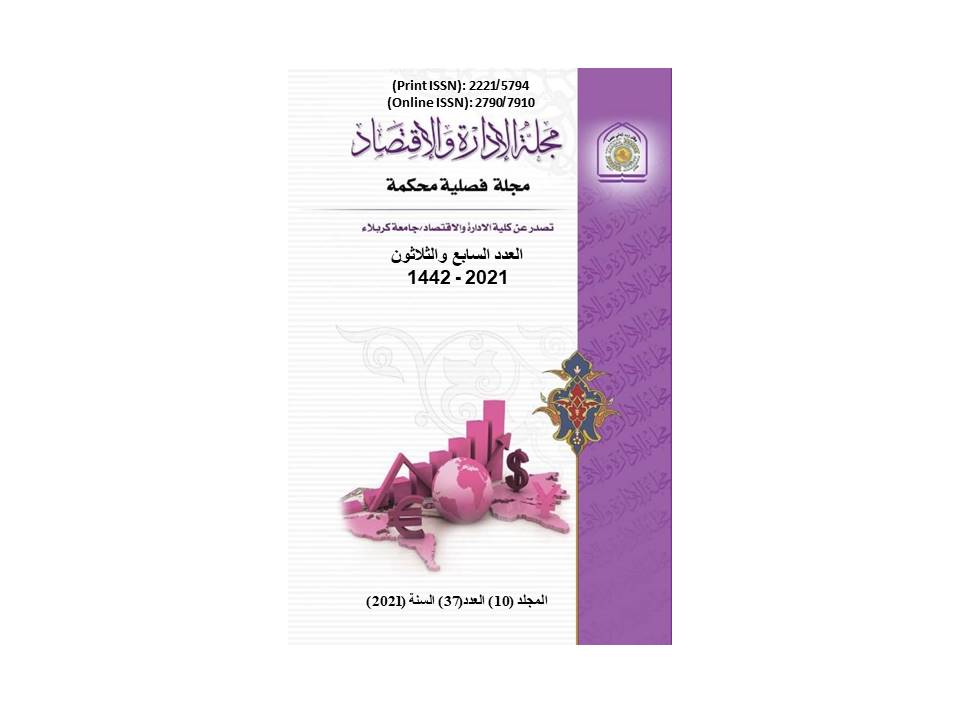Abstract
Abstract:
The objective of the research was to determine the level of direct impact of the social identity of workers in strengthening the value system at the level of a sample of members of the teaching staff of private universities and colleges in the holy Karbala Governorate, as the social identity of the workers was measured by three dimensions (symmetry, pride, respect) based on To (Blader and Tyler, 2009), and the value system was measured according to six dimensions (affiliation values, compliance values, goodness values, support values, independence values, and leadership values) based on (Altueaniu,2010). The research relied on the descriptive analytical approach in presenting, analyzing, and interpreting information. The questionnaire also used a major tool in collecting data from a sample of (189) faculty members working in the researched private universities and colleges. A set of statistical methods were used that helped in analyzing the research data and the hypothesis test represented by the simple correlation analysis (Pearson) to measure the correlation relationships between the variables, and confirmatory factor analysis. (R2) was used to explain the effect of the independent variables on the dependent variable. One of the most important conclusions reached by the research is the presence of a direct and significant influence of the social identity of workers in strengthening the value system.
The objective of the research was to determine the level of direct impact of the social identity of workers in strengthening the value system at the level of a sample of members of the teaching staff of private universities and colleges in the holy Karbala Governorate, as the social identity of the workers was measured by three dimensions (symmetry, pride, respect) based on To (Blader and Tyler, 2009), and the value system was measured according to six dimensions (affiliation values, compliance values, goodness values, support values, independence values, and leadership values) based on (Altueaniu,2010). The research relied on the descriptive analytical approach in presenting, analyzing, and interpreting information. The questionnaire also used a major tool in collecting data from a sample of (189) faculty members working in the researched private universities and colleges. A set of statistical methods were used that helped in analyzing the research data and the hypothesis test represented by the simple correlation analysis (Pearson) to measure the correlation relationships between the variables, and confirmatory factor analysis. (R2) was used to explain the effect of the independent variables on the dependent variable. One of the most important conclusions reached by the research is the presence of a direct and significant influence of the social identity of workers in strengthening the value system.
Abstract
الملخص
هدف البحث الى تحديد مستوى التأثير المباشر للهوية الاجتماعية للعاملين في تعزيز المنظومة القيمية على مستوى عينة من أعضاء الهيئة التدريسية للجامعات والكليات الاهلية في محافظة كربلاء المقدسة، إذ جرى قياس الهوية الاجتماعية للعاملين بوساطة ثلاثة أبعاد هي (التماثل، الفخر، الاحترام) استناداً الى (Blader and Tyler,2009)، وجرى قياس المنظومة القيمية بموجب ستة أبعاد هي (قيم الانتماء، قيم الامتثال، قيم الخير، قيم الدعم، قيم الاستقلال، وقيم القيادة) استناداً الى(الطعاني،2010). واعتمد البحث على المنهج الوصفي التحليلي في عرض وتحليل المعلومات وتفسيرها، كما استخدمت الاستبانة أداةً رئيسة في جمع البيانات من عينة بلغت (189) من أعضاء الهيئة التدريسية العاملين في الجامعات والكليات الاهلية المبحوثة، وقد تم استخدام مجموعة من الأساليب الاحصائية التي ساعدت في تحليل بيانات البحث واختبار الفرضيات والمتمثلة بتحليل الارتباط البسيط (Pearson) لقياس علاقات الارتباط بين المتغيرات، والتحليل العاملي التوكيدي، كما استخدم (R2) لتفسير مقدار تأثير المتغيرات المستقلة في المتغير التابع. ومن أهم الاستنتاجات التي توصل اليها البحث وجود تأثير مباشر ذي دلالة معنوية للهوية الاجتماعية للعاملين في تعزيز المنظومة القيمية.
هدف البحث الى تحديد مستوى التأثير المباشر للهوية الاجتماعية للعاملين في تعزيز المنظومة القيمية على مستوى عينة من أعضاء الهيئة التدريسية للجامعات والكليات الاهلية في محافظة كربلاء المقدسة، إذ جرى قياس الهوية الاجتماعية للعاملين بوساطة ثلاثة أبعاد هي (التماثل، الفخر، الاحترام) استناداً الى (Blader and Tyler,2009)، وجرى قياس المنظومة القيمية بموجب ستة أبعاد هي (قيم الانتماء، قيم الامتثال، قيم الخير، قيم الدعم، قيم الاستقلال، وقيم القيادة) استناداً الى(الطعاني،2010). واعتمد البحث على المنهج الوصفي التحليلي في عرض وتحليل المعلومات وتفسيرها، كما استخدمت الاستبانة أداةً رئيسة في جمع البيانات من عينة بلغت (189) من أعضاء الهيئة التدريسية العاملين في الجامعات والكليات الاهلية المبحوثة، وقد تم استخدام مجموعة من الأساليب الاحصائية التي ساعدت في تحليل بيانات البحث واختبار الفرضيات والمتمثلة بتحليل الارتباط البسيط (Pearson) لقياس علاقات الارتباط بين المتغيرات، والتحليل العاملي التوكيدي، كما استخدم (R2) لتفسير مقدار تأثير المتغيرات المستقلة في المتغير التابع. ومن أهم الاستنتاجات التي توصل اليها البحث وجود تأثير مباشر ذي دلالة معنوية للهوية الاجتماعية للعاملين في تعزيز المنظومة القيمية.
